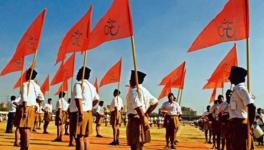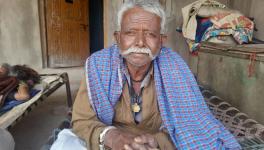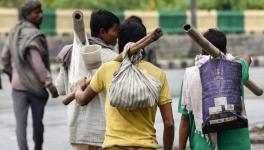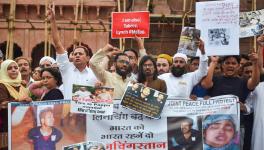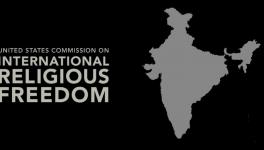Rakbar Lynching Case: 7 Years’ Jail Will Make no Difference, Sought ‘Deterrent’, Says Dairy Farmer’s Widow
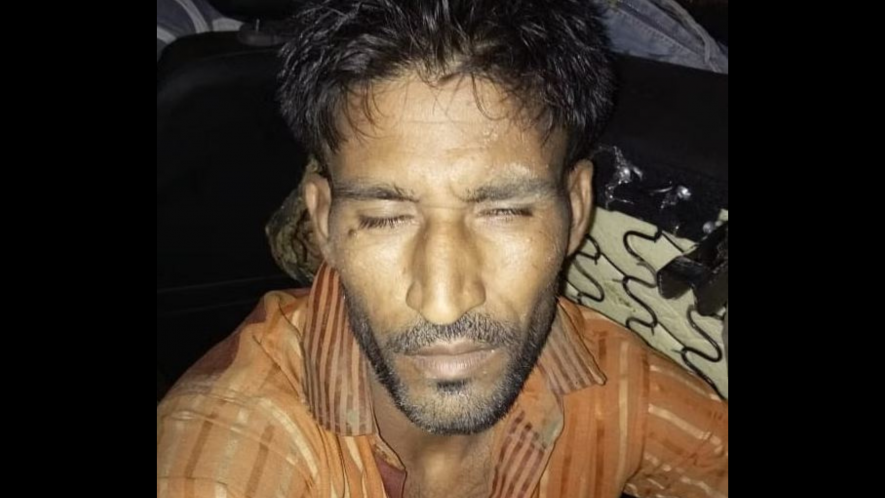
New Delhi: “Neither will this decision bring a change in our lives nor will it be a deterrent for those who do not think twice before killing anyone in the name of protecting cows,” said Asmina after a Sessions Court in Alwar (Rajasthan) sentenced four convicts to seven years in prison for lynching her husband Rakbar Khan (34), a dairy farmer, to death in July 2018 for ferrying two cows.
“I don’t want the death penalty for those who made my children orphans, but the punishment awarded to the murderers cannot even be called justice,” Asmina told NewsClick.
Khan and his friend Aslam were herding cows on foot through a forest area near Lalawandi (Alwar district) to his village Kolgaon in Haryana when he was waylaid and brutally assaulted by Vijay Kumar (28), Naresh Sharma (32), Dharmendra Yadav (27) and Paramjeet Singh (37) on the midnight on July 20, 2018, on suspicion of cow smuggling.
While he sustained severe injuries and died in the custody of police — who prioritised taking the cattle to a shed rather than rushing the victim to a hospital -- his friend managed to flee.
Khan’s ribs — according to the autopsy report — had suffered fractures, which led to water filling in his lungs, causing death.
In a brazen display of being negligent and irresponsible toward the victim, the police, instead of taking him directly to a hospital, spent a good amount of time (at least 20-25 minutes) in search of Aslam. Then they took the victim to Ramgarh police station (about 6 kilometres away from the spot) to record his statement, stopping for tea on the way and then going to drop off the cows at a ‘Gaushala’.
After Khan was taken to the Community Health Centre at Ramgarh village, he was declared 'brought dead'. This implies that he collapsed in police custody.
Concluding that the four convicts had “no intention to kill” Khan, Additional District and Sessions Judge Sunil Kumar Goyal, on May 25, held them guilty under Sections 304 (1) (culpable homicide not amounting to murder) and 341 (wrongful restraint) of the Indian Penal Code (IPC).
The court acquitted the accused, Naval Kishore Sharma (48), leader of the Vishwa Hindu Parishad (VHP) and chief of a ‘Gau Raksha Dal’ (cow protection squad) in Ramgarh. The court refused to accept the proof against him as “clinching” evidence. He was discharged of all charges on account of “benefit of the doubt”.
In the 92-page judgment, written in Hindi, the judge said the accused and the victim were neither known to each other nor did they have enmity. According to him, this established that the four men did not intend to kill the victim.
The court also held that the convicts had no idea that the injuries inflicted during the collective beatings were grievous enough to cause death, as none of the 13 wounds was on any of Khan's sensitive organs.
“Being associated with a ‘Gau Raksha Dal’ (cow vigilante group), they apparently became overenthusiastic and took the law into their own hands. They assaulted him (Khan) while attempting to stop the smuggling of cows,” reads the judgment (a copy of which has been seen by NewsClick).
Further explaining the rationale behind arriving at the conclusion that the accused had no intention to kill, the judge said, “They thrashed him with ordinary weapons such as sticks. He died in police custody because Assistant Sub-Inspector Mohan Singh completely failed in carrying out his duty and acted in an irresponsible and negligent manner. If the accused had any intention to kill, they could have murdered him on the spot. On the contrary, they helped take him to a police jeep from the spot, cleaned his mud strained body, changed his clothes and helped take him to hospital from the police station. It indicates that their intention was not murder him at all. They would also not have asked Naval Kishore to inform the police,” added the judgment.
Acquitting Kishore, the judge said though he was in touch with the convicts on his mobile phone, the prosecution failed to prove his presence at the crime spot and his complicity in the offence beyond reasonable doubt.
The court refused to accept that Aslam identified Kishore and termed his statement “unreliable”. “As soon as the assault began, Aslam fled from the spot. It was night-time, dark and raining,” said the court, adding that since the VHP leader was initially made a witness by the police under CrPC 161, it is possible that the witness might have seen him before the identity parade — which was conducted in jail in the presence of a magistrate.
Before arriving at the conclusion, the court also took note of the claim that Kishore’s clothes were not muddy, even though the spot was muddy and it was raining. “Had he assaulted the victim, his clothes too would have been muddy,” it said.
Giving him the benefit of doubt, the court said he cannot be held guilty merely because of his association with an organisation (the VHP) or being chief of a cow shed.
Such illegal activities, said the court, in a secular country like India, severely harm the soul of the Constitution.
“If a soft approach is adopted in such cases, which have widespread effect on the society, it might send a negative message in the society,” the judge observed in his order, which also added, “Even if the cows were being smuggled, the accused had no right to take law in their hands and assault someone. The ends of justice would meet if an appropriate sentence was handed down to the convicts.”
However, the strong-worded verdict does seem to be in consonance with the quantum of punishment awarded. The court also seems to have ignored the fact that changing clothes, etc. might have been intended to destroy evidence.
“It’s true that Rakbar died in police custody. But who caused him the injury that resulted in his death? It was the accused. Then why were they not convicted for murder? They inflicted 13 injuries, not just one or two. Therefore, the conclusion that the convicts had no intention to kill the victim falls flat. They should have been convicted under Section 302 of the IPC and sentenced to life imprisonment,” Special Public Prosecutor Nasir Ali Naqvi told NewsClick, adding that the sentence is insufficient and that he has suggested that the government should challenge the verdict in the High Court.
With regard to Kishore’s acquittal, Naqvi questioned how the court considered Aslam’s statement to convict others, but the same was discarded for Naval?
He said the sentence was in violation of the judgment delivered by the Supreme Court in the Tehseen S Poonawalla Vs Union of India case that prescribes maximum punishment in cases of mob lynching.
“Even under Section 304 of the IPC, the convicts should have been given the maximum punishment of life imprisonment,” he added.
Kishore’s acquittal is “highly objectionable”, Advocate Asad Hayat, who has been monitoring the case since beginning, told NewsClick.
“As per the prosecution’s case, the four accused caught and thrashed Rakbar and then dialled Kishore to come to the spot and inform the police that they had caught a cow smuggler. The persecution had presented a call record to establish the same, but the court refused to accept it as ‘clinching evidence’. The question here arises as to why one of them called Kishore instead of directly calling the police. When they claim themselves to be ‘Gau Rakshaks’, they must have contacts with the police,” he said.
Hayat said the case record suggests that there was a “conspiracy”.
“Discharging an accused merely on the basis of his absence from the crime scene is not justified, as any direct evidence of a criminal conspiracy is rarely found,” he added, claiming that Naresh, Dharmendra, Paramjit, Vijay and Kishore were all associated with a ‘Gau Raksha Dal’.
“They executed the incident following a conspiracy, which they “hatched in collusion with the police in furtherance of common intention,” he alleged.
To establish his claim, Hayat argued that the accused themselves told the court that one of them informed Kishore about the incident over phone but the latter did not inform the cops before the commission of the crime.
“This makes it clear that the assault was carried out under the so-called cow protection campaign by the group with a common intention. Aslam said in his statement to the court that he (Kishore) was at the spot and told them (the four convicts) to kill the ‘bastard’ (the victim). He said these people (the alleged cow smugglers) won’t take a lesson till two or four of them die. If they don’t shun cow smuggling/slaughter, they will die like this. He told them the MLA is with them. One of them then asked Kishore to inform the police as the work had been done. He (Kishore) replied that he had left his cell phone at home. ‘I am going home, I will call the police and bring them here. You all stay here and don’t go anywhere,’ Aslam has quoted Kishore in his statement as saying,” according to Hayat.
Following Kishore’s arrest, he said, the witness identified him (the VHP leader) in the presence of the magistrate in the jail. “The court conveniently ignored several clinching evidence that were sufficient for Kishore’s conviction,” he alleged.
‘I WANT A DETERRENT, NOT REVENGE’
Asmina said she wanted harsher punishment (life imprisonment), but not death sentence, for all the five who murdered her husband and orphaned her children.
“The sentence should at least be a deterrent. Seeking the death penalty would be revenge, which I do not want as they must be someone’s sons and fathers. And their children don’t deserve to be orphaned,” she told NewsClick, thanking the judiciary for deciding the case without delaying it for long.
Asmina alleged the Rajasthan Police deliberately did not put up a strong case to help Naval Kishore go scot-free. “The other accused too have been saved. I will challenge the verdict in the High Court to ensure that justice is done,” she added.
When Rakbar Khan was killed, his wife was expecting their seventh child, who was born three months after the incident. Following the death of their father, who was the sole breadwinner of the family, the responsibility of their upbringing has fallen on Asmina.
She was left alone to carry out such a huge responsibility after her father-in-law, Suleman, also died in 2021.
“After my husband, my father-in-law's death further aggravated our troubles. It is becoming extremely difficult to bear the cost of upbringing and educating the children. Of the four elder daughters, two go to a school run by the wife of Hamid Ansari (former Vice President of India) and other two attend the village government school,” she said.
Last year, Asmina suffered severe injuries when she met with a road accident while going to drop off the rest of children to a madrasa. She is partially handicapped now.
Like before, the family still survived on the small dairy farming, as agricultural farming is not enough to make ends meet. “My husband was not a cow smuggler, he used to trade milch cows. Cattle fostering is our family business. Even my father had given my husband cows as dowry,” she said, acknowledging that she received help from various individuals and groups that are still contributing to run her family.
Urging the Haryana and Rajasthan governments to make some arrangements to address her financial woes, the widow said the states should set up a commission to extend financial assistance to victims of mob violence.
This is the first conviction in Rajasthan in a case of cow vigilantism. Giving them the benefit of doubt on the basis of “contradictions” in the investigation and the prosecution’s evidence, the same court had previously acquitted all the six accused in the infamous April 2017 Pehlu Khan lynching case — which was caught on camera.
Following a nationwide uproar after Khan’s brutal murder in the name of cow protection and in view of the impending Assembly election in 2018, the then Bharatiya Janata Party (BJP) government in the state had taken swift action and ensured that arrests were made at the earliest.
Then state Home Minister Gulab Chand Kataria had visited the crime spot and also admitted that Pehlu Khan died because the police delayed rushing him to hospital. A sub-inspector was suspended and three policemen were sent to the Police Lines.
Get the latest reports & analysis with people's perspective on Protests, movements & deep analytical videos, discussions of the current affairs in your Telegram app. Subscribe to NewsClick's Telegram channel & get Real-Time updates on stories, as they get published on our website.










